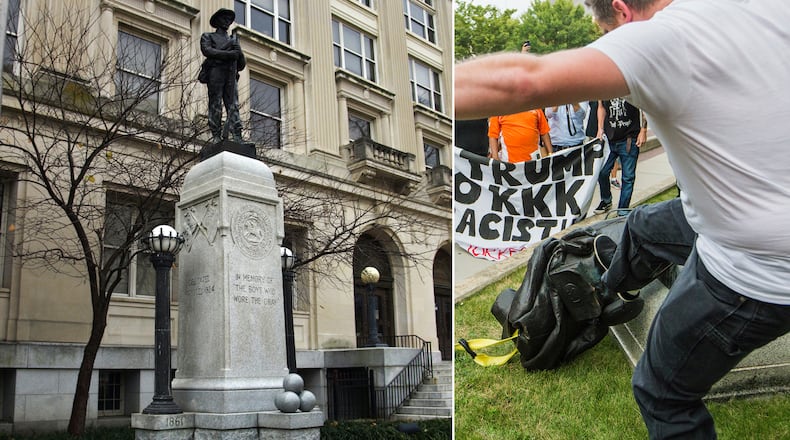Morgan McNeel didn’t quite understand what he was seeing when the statue toppled to the ground.
Protesters looped a yellow strap around the neck of a Confederate statue at the Durham County courthouse in North Carolina and yanked. When they did, a piece of McNeel’s family history tumbled headfirst into the grass.
Two generations ago, his kin founded the McNeel Marble Co. in Marietta and grew it into one of the nation’s most prolific Confederate monument makers. Often using Georgia granite and Italian marble, they built more than 140 Confederate monuments, of which dozens are in Georgia.
So far, eight people have been arrested for destroying the Durham statue; all are charged with two felonies and some lesser charges.
“These little snowflakes think that they can get away with whatever they want and they’re going to protest and destroy and tear this country apart,” said McNeel, 48.
By the time the Durham statue was dedicated in May 1924, the McNeel Marble Co. had already distributed more than 140 monuments throughout the United States, according to a catalog from the time.
Gould Hagler, a Dunwoody man who wrote the book "Georgia's Confederate Monuments," said McNeel made more of the state's monuments to the Confederacy — 42 — than any other company. And McNeel prospered, eventually opening offices in Birmingham and New York.
Experts agree that demand for Confederate monuments spiked twice: at the turn of the 20th century and about the time of the civil rights movement.
Advertisements from the early 1900s show campaigns to sell monuments to communities for the 50th anniversary of the Civil War.
One reads: "Why not buy it NOW and have it erected before all the old veterans have answered the final roll call?"
The 1924 catalog shows 142 monuments appeared in cities from Front Royal, Virginia, to Bradenton, Florida, to Graham, Texas. Listed at the bottom of one page is “Durham, N.C.”
The catalog also includes the Illinois monument at Kennesaw Mountain National Battlefield Park honoring the Union.
Hagler said the catalog probably lists most of the monuments McNeel made, considering demand slowed greatly after the mid-1920s.
In an August 1914 issue of Confederate Veteran magazine, McNeel Marble ran an advertisement entitled "SUPREMACY," claiming that it had created "thousands of artistic memorials dotting all sections from Maryland to the Mexican line."
There’s no evidence that the company made “thousands” of monuments. Historians and the family, however, don’t have a full accounting of what McNeel built in its nearly 70 years.
“The focus wasn’t on the artisans who made it; the focus was on the men that they honored,” he said.
Credit: Gould Hagler
Credit: Gould Hagler
The Southern Poverty Law Center started a national analysis of Confederate memorials in June 2015 after Dylann Roof — who talked of starting a race war — killed a pastor and eight other people at the historically black Emanuel AME Church in Charleston, South Carolina.
The study, which the SPLC admitted was incomplete, said it reviewed federal and state databases along with private submissions to come up with the list. It found Georgia has 90 Confederate monuments. That's a tie with North Carolina for the second most in the nation; Virginia allegedly has the most.
The study includes nearly every Georgia city listed in the McNeel catalog and matches the timetable for when the company would have been making the statues, so it is feasible that McNeel made almost half of the state’s Confederate monuments.
“They made a good living off of towns that wanted to decorate their Civil War general or colonel or their hometown hero,” McNeel, whose great-grandfather helped start the McNeel Marble Co. in 1892.
McNeel, who is a vice president of Marietta-based McNeel Builders, which was started by his father, said his family's monuments are history that shouldn't be erased.
“To me, it’s pathetic,” he said. “These people think they got a right to do whatever they want because they never got told they can’t.”
He said residents of a municipality who want the statues removed need to put it on a ballot and let the electorate decide.
“Just because you got a Robert E. Lee doesn’t make you a racist town,” said McNeel.
He said he went to the recent presidential inauguration and saw protesters “spewing hate at everybody, clogging all the streets.”
“They don’t need to have violent mobs. That’s not what this country is supposed to be about,” said McNeel, whose great-great grandfather fought in a cavalry regiment for the Confederacy.
About the Author
The Latest
Featured



